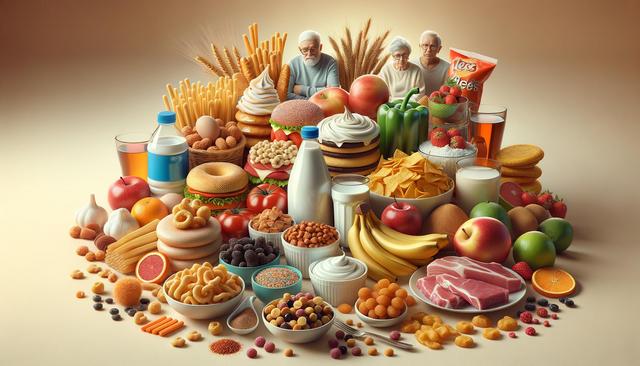Why Diet Matters More as We Age
As we grow older, our bodies go through many changes—both visible and invisible. Metabolism slows down, digestive systems become more sensitive, and nutrient absorption may decline. These shifts make it especially important for seniors to be mindful of their diet. Choosing the right foods helps maintain energy levels, supports immune health, and reduces the risk of chronic illnesses. Likewise, avoiding certain foods can help prevent discomfort, inflammation, and even serious medical conditions. Being selective about what goes on your plate can make a significant difference in how you feel day to day and how well your body functions over time.
Older adults are often more susceptible to the effects of unhealthy food choices, which can contribute to heart disease, high blood pressure, diabetes, and bone loss. Because of this, making informed decisions about what to eat—and what not to eat—is a key part of aging well. By steering clear of foods that are overly processed, high in sodium, or lacking in nutrients, seniors can improve their overall well-being and longevity.
Processed Meats and High-Sodium Foods
One of the top categories of food seniors should avoid includes processed meats and foods high in sodium. These items are often packed with preservatives, additives, and excess salt, which can lead to high blood pressure and increase the risk of heart disease. Many deli meats, canned soups, frozen meals, and snack foods fall into this category and may seem convenient, but they can have negative long-term effects on health.
Too much sodium in the diet can cause:
- Increased blood pressure
- Strain on the kidneys
- Fluid retention and swelling
Reducing salt intake doesn’t mean sacrificing flavor. Herbs, spices, and natural seasonings can enhance meals without adding health risks. Choosing fresh, unprocessed meats and preparing meals at home using wholesome ingredients is a practical step toward better heart and kidney health.
Sugary Foods and Drinks
Excess sugar is another major concern for older adults. Consuming high amounts of sugar can lead to weight gain, increase the risk of type 2 diabetes, and contribute to tooth decay—all of which are especially concerning for seniors. Sweets, pastries, sodas, and even sweetened yogurts can deliver more sugar than expected, often with minimal nutritional benefit.
Limiting sugar intake supports:
- Stable blood sugar levels
- Better dental health
- Lower risk of chronic inflammation
Instead of reaching for sugary treats, opt for naturally sweet options like fruits. These not only satisfy sweet cravings but also provide fiber, vitamins, and antioxidants. Reading food labels and being aware of hidden sugars in sauces, dressings, and packaged goods can also help in making healthier choices.
Fried and Fatty Foods
Fried foods and those high in unhealthy fats can be particularly harmful to seniors. These items are often loaded with trans fats or saturated fats, which can raise bad cholesterol levels and increase the risk of cardiovascular disease. Common offenders include fried chicken, French fries, and baked goods made with shortening or lard.
Regular consumption of these foods may result in:
- Elevated cholesterol
- Reduced mobility due to weight gain
- Increased inflammation in the joints
Choosing baked, grilled, or steamed options instead of fried ones can make a big difference. Healthy fats—from sources like avocados, nuts, and olive oil—should be included in the diet in moderation to support brain and heart function.
Highly Refined Carbohydrates
White bread, white rice, and other highly refined carbohydrates are stripped of their natural nutrients and fiber. These foods break down quickly into sugar, causing spikes in blood glucose levels. For older adults, this can be particularly problematic, especially for those managing diabetes or prediabetes.
Negative impacts of refined carbs include:
- Rapid blood sugar fluctuations
- Lack of sustained energy
- Digestive issues due to low fiber
Whole grains—such as brown rice, oats, and whole grain bread—offer a more balanced alternative. They help maintain energy throughout the day, support digestive health, and contribute to better blood sugar management.
Alcohol and Caffeinated Beverages
While an occasional drink or cup of coffee may not pose a serious threat, excessive consumption of alcohol and caffeine can be problematic for seniors. Alcohol can interfere with medications, impact liver function, and increase the risk of falls. Caffeine, on the other hand, may cause sleep disturbances, increase anxiety, and lead to dehydration if consumed in large amounts.
Reasons to limit alcohol and caffeine include:
- Improved sleep quality
- Better hydration
- Reduced risk of medication interactions
Hydration is essential at any age, but it becomes especially important as we grow older. Water, herbal teas, and naturally flavored waters are excellent alternatives that support overall health without the downsides associated with alcohol or excessive caffeine.
Conclusion: Choosing Wisely for Healthy Aging
As we age, the foods we eat play a growing role in how we feel each day and how well we live. By avoiding processed meats, excess sugar, fried foods, refined carbs, and limiting alcohol and caffeine, seniors can take control of their health and enhance their quality of life. Making thoughtful food choices helps reduce the risk of chronic disease, supports mobility, and contributes to mental clarity and emotional well-being. Small, consistent dietary changes can lead to meaningful improvements, empowering older adults to stay active, independent, and full of life for years to come.


